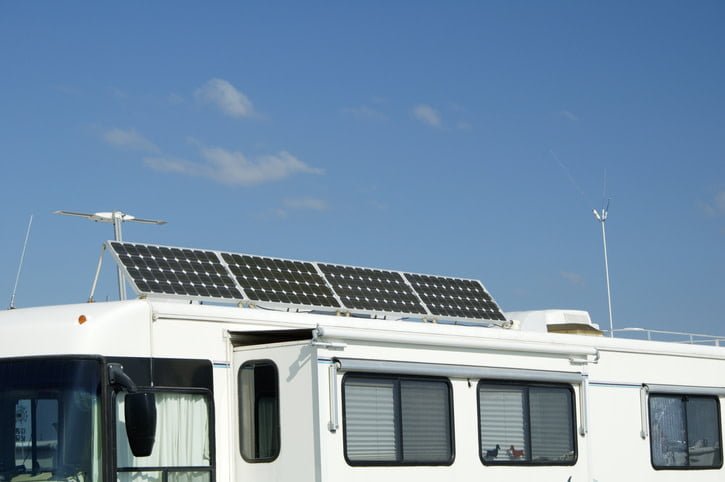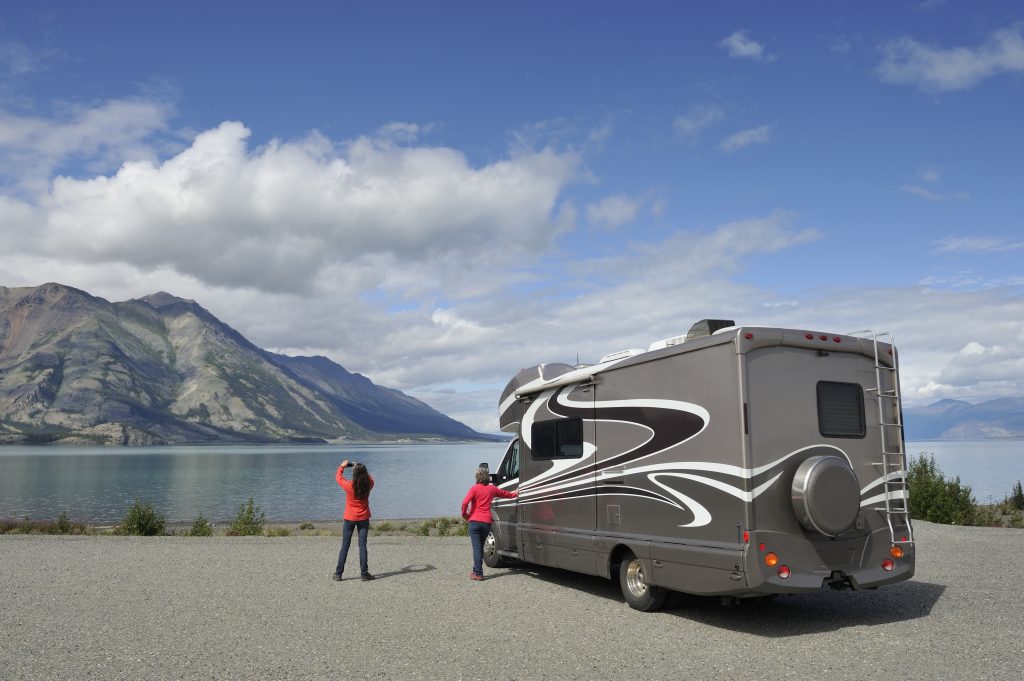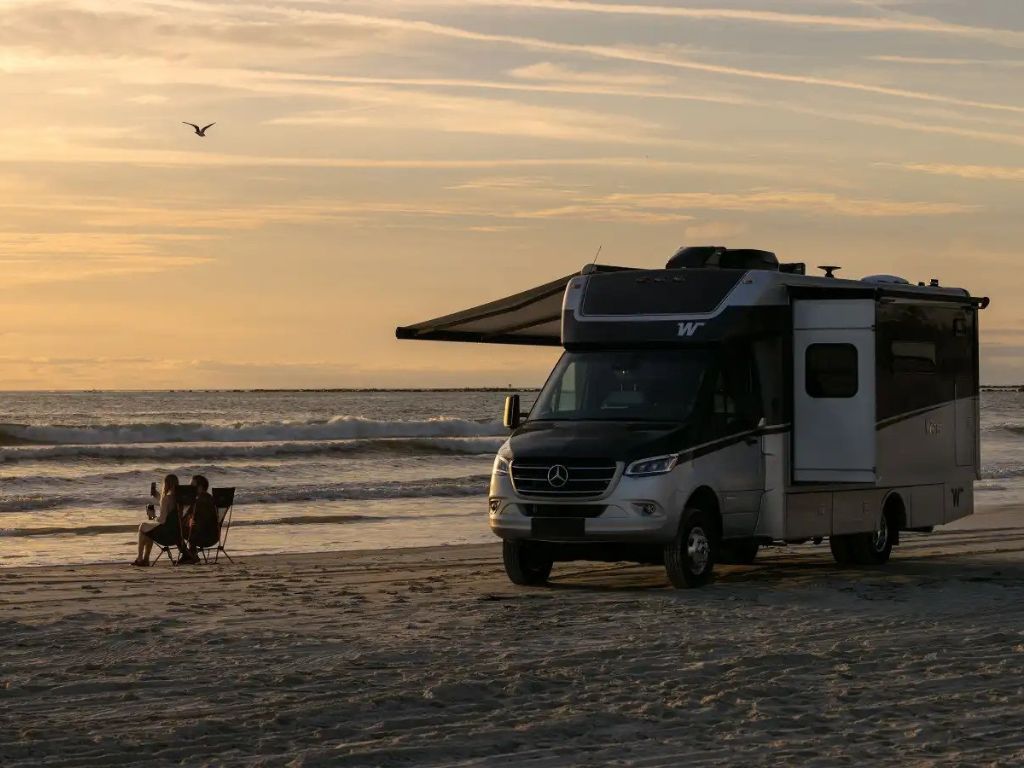Powering your RV with solar energy is a smart thing to do. Drawing power from the Sun is clean, efficient and quiet. So why doesn’t everyone do it? Well, the fact is that most new RVs now have integrated roof mounted solar panels that feed the house batteries. Most of these systems though are basic and low-Watt applications. But it is a good place to start. Furthermore, those same RVs may already be wired to accept freestanding panels that can increase the amount of power you can collect.
Now, before we get into the hardware, you need to go back to school. By that I mean you must understand how much power you need – otherwise all the numbers won’t make any sense when you start looking at panels, inverters and batteries.
Basic electrical units of measurement:
- Watt is the power needed to run something Watt = (Amperes x Volts)
- Voltage is potential (think work done) Voltage = (Watt divided by Ampere)
- Ampere is current speed Ampere = (Watt divided by Voltage)
- AC – is Alternating current – like what’s delivered to your house
- DC – is direct current – the power delivered by a battery storage system
Example: If a TV runs at 110V AC and is rated 90W. This tells us that it draws about 0.81A AC.
However, the power from our battery (DC) must be converted first. To convert AC to DC, you multiply by 10: 10A AC is 100A DC. So converted, our TV requires 8.1A DC to run. Watching TV for one hour will consume that 8.1A – If you have a 100A battery, you could watch about 12 hours before the battery died. However, you should never run your batteries until they are dead.
If you now add up all the Watts needed to run your on-board appliances and calculate the needed DC Amps – well, now you have an idea of your true power usage.
Let’s say your estimate is 120Ah per day usage. Your solar panels are rated to deliver 160Ah per day and you have a storage battery with a capacity of 400Ah. This system then should balance your usage and recharge rate.
So, I did an internet search for solar panels and there are hundreds of products and options that come up. I chose one, at random, just to use as an illustration of available product and average price. I do not endorse this product, it’s just an example. Ultimately you have to do your own research; what I’m doing here is just passing on basic solar power knowledge.
Allpowers SunPower 100W RV Solar Panel:
- SunPower Solar Cell the SunPower cell is up to 23.5% efficient.
- The water resistant semi-flexible solar SunPower panel is far more durable than traditional glass and aluminum models; The junction box is sealed and waterproof.
- Bendable Panel: The plastic back sheet can be curved to a maximum 30-degree arc and mounted on an RV, boat, cabin, tent, car, trucks, trailers.
- Powerful and lightweight: This solar panel packs 100W of power, but it only weighs a mere 4.7lbs(2.15kg).
- What you get: 100W bendable SunPower solar panel, instruction manual, 18-month guarantee and friendly customer service
- Price: Around $150.00 per panel.
ECO-WORTHY 400W Solar Panel System:
2pcs 195W Solar Panels with 60A Charge Controller Kit for homes, RV, and trailer.
- 1.6kWh daily output depends on the sunlight condition, means full charge a 12V 160Ah battery bank, perfect for Class C Motorhomes.
- 60A controller with readout LCD and charging protection.
- The system can be modified on auto 12/24V. Panels wattage can be extended up to 1000 watts when 12V,- 2000 watts when 24V.
- Easy to install by Z brackets + cable entry, each panel comes with 2.95ft MC4 cables for easy hookup.
- One-year warranty with lifetime technical support.
- The system is priced at around $700.
Go Power! Weekender SW Complete Solar and Inverter System, 160:
The complete kit includes everything you need to hook up solar and inverter system. The Weekender SW kit is designed for anyone that would like the benefit of solar power to charge their batteries, and the ability to use AC appliances when there is no utility power available. For example, you can run a microwave, TV, blender, audio sound equipment, computers and more. The Weekender kit contains a 160-Watt solar charging kit and a 1500-Watt pure sine wave inverter system. The Weekender includes everything you need to hook the solar and inverter system up to your batteries and install the solar panel on a flat surface. Go Power! recommends at least a 200-amp hour battery bank for the Weekender SW kit. This kit is priced at around $1,000.
If you don’t have a deep cycle battery in your RV already and want to use solar power, you’ll need one. That way you can store the generated power for later use. Solar panels can work with 12V or 24V batteries.
A look at the three different types of RV batteries that can be hooked up to solar panels:
Wet Batteries: These are the most common batteries – lead/acid. These can provide high peak draw and withstand deeper discharge cycles.
Gel Batteries: Instead of water/acid, these use a silica gel between plates. These are more difficult to charge and therefore not compatible with all charge controllers. They are more expensive and don’t perform so well in a rapid discharge situation.
AGM Batteries: This stands for Absorbed Gas Mat. These batteries have a glass plate inside and are not prone to spillage. These are the preferred option for RV deep cycle batteries. They withstand rapid discharge down to around 60% and can be re-charged quickly.
The last part of the solar power trio is the power inverter – as mentioned, you must convert DC power to AC and that’s what a power inverter does. These are rated in Watts. For example, a 1500W inverter is sufficient to operate smaller appliances of around 10A AC current, such as a TV, a coffee maker, a laptop, lamps etc. For more current, you need a more powerful inverter. The more power you draw, the quicker the battery bank is depleted. So, a larger bank is needed, or more solar panels.




